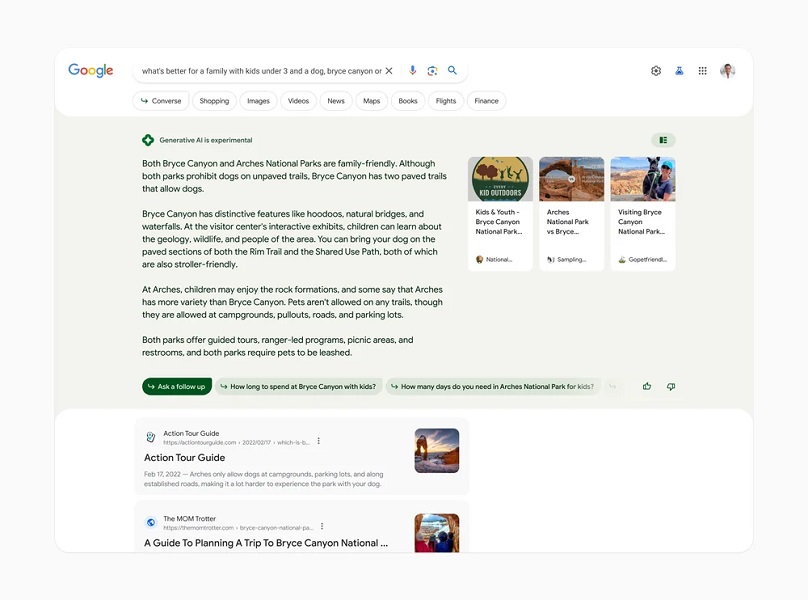
What you need to know
- Google introduces generative AI-powered search results.
- These results, backed by AI, help understand a topic or context quicker.
- The results are advanced and instantaneous, with the ability to add follow-up questions.
Google Search dominance has been largely unchallenged as it's the default search engine for most people. However, with players like Bing trying to catch up with it, aided by ChatGPT, the search giant is also jumping on the bandwagon to incorporate its own AI magic.
While it already has Google Bard as an alternative, the company announced that it's bringing generative AI to its Google Search via a new SGE (Search Generative Experience), which will help generate search results using Artificial Intelligence. The primary aim of the new AI abilities is to help users comprehend a topic quicker and get to know various insights and viewpoints for the search query, ultimately making it a seamless process.
If users are used to asking multiple questions relating to a single event or a topic, the new generative AI could take all of them in a single query and give some interesting details, which otherwise was only possible by breaking the questions, contexts, or topics into multiple ones.
For example, Google cites a query asking, "what's better for a family with kids under 3 and a dog, bryce canyon or arches." It is a bit longer than usual, with multiple elements and contexts. This is where the said generative AI comes into play to do the heavy lifting. It shares a "snapshot with key information to consider, with links to dig deeper," Google says in the announcement blog post.
"Below this snapshot, you'll see suggested next steps, including the ability to ask follow-up questions, like "How long to spend at Bryce Canyon with kids?" When you tap on these, it takes you to a new conversational mode, where you can ask Google more about the topic you're exploring," Google added.

Context is carried from question to question, eventually making the exploration playful. It also gives jumping-off points to relative web content available to give additional perspectives.
The generative AI will also help users explore search results and ease them to make a complex purchase smoother and faster. The new update involves search results involving product descriptions, which further comprise relevant, latest reviews, ratings, prices, and product images.
The AI shopping experience is built on Google's Shopping Graph, which has "more than 35 billion product listings — making it the world's most comprehensive dataset of constantly-changing products, sellers, brands, reviews and inventory out there."
Amidst the advanced search results that generative AI is capable of, Google promises to send traffic to relevant websites across the internet to dive into more detail about the topic or context a user is looking for. Users can also witness Search ads in dedicated slots across the page.
Generative AI is not always correct, and Google knows it, which is why it is committed to taking a "responsible and deliberate approach" and training the models with a "high bar of quality" alongside improvements.
Google says the experimental update Search Labs features will be available on Chrome desktop and the Google App for Android devices and iOS platforms. And it is currently limited to the English language in the U.S at the moment.
Users interested in testing the feature may sign-up now through Google's new Search Labs, which you can find in the Search app as a small icon in of a beaker in the top corner. Access to SGE is likely to commence in the coming weeks.







